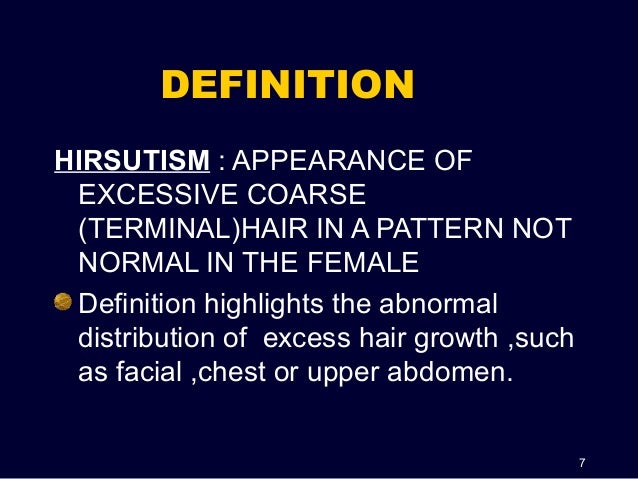Hirsutism is excessive body hair in women on parts of the body where hair is normally absent or minimal, such as on the chin or chest. It refers to a male pattern of hair growth that may be a sign of a more seriousmedical condition, especially if it develops well after puberty.
Treatment for hirsutism often involves a combination of self-care methods, hair-removal therapies and medications.
See Causes Listed Below.
The condition you have, called hirsutism, is not uncommon and can be treated.
Why does hair grow so extensively on a man’s face? Each hair grows out of a little pit in the skin called a follicle. Cells that live in the base of that pit cause the hair to form when androgens (“male” hormones) in the blood reach those cells. So two things are required: androgens in the blood, and cells that respond to androgens by making hairs.
Why would hair grow on some women’s faces the way it grows on most men’s faces? Because men and women are not as different as you might think. Women actually have measurable amounts of androgens in their blood. The levels are much lower than they are in a man’s blood, but they are present. And the cells in the hair follicles on a woman’s face also make hairs in response to androgens.
When a woman has unusually high levels of androgens in the blood, she can start to grow hair in places that most women don’t. Such hair growth may also be caused by cells in the hair follicles that are more easily stimulated by androgens to make hairs, even when androgen levels are normal.
In some cases, the extra androgen comes from medications. Some birth control pills as well as certain steroids contain androgens, or have effects similar to androgens. Other drugs indirectly cause the body to make extra androgen hormones; these include some medicines to treat schizophrenia, seizures, migraine headaches, bipolar disorder and high blood pressure.
Occasionally, an abnormality in the ovaries, the adrenal glands or the pituitary gland can cause overproduction of androgens. One such (common) condition is polycystic ovarian syndrome. Your doctor can rule out these causes with various blood tests.
If your doctor diagnoses a specific cause, he or she can suggest appropriate treatment. For example, the rare tumors that produce androgen hormones can be treated with surgery, radiation or both.
All women with hirsutism can benefit from cosmetic treatments. These include:
- Plucking, shaving, waxing or depilatory creams.
- Laser hair-removal techniques use light to generate heat inside hair follicles, destroying their ability to produce hair.
- Electrolysis also destroys the ability of the follicles to grow hair by using electricity to produce heat within the hair follicles. It can leave small areas of scarring.
Long-term use of medical treatments can decrease levels of androgens or their impact on hair follicles. Medical treatments include:
- Estrogen-containing medicines. Several medicines, including birth control pills that contain both estrogen and progesterone, can alter the impact of androgens.
- Anti-androgen medicines. The most commonly used medicine is spironolactone (Aldactone). Others are available.
- http://www.askdoctork.com/what-causes-excess-facial-hair-in-women-and-how-is-it-treated-201209032898
Causes
At puberty, a girl's ovaries begin to produce a mix of female and male sex hormones. This causes hair to grow in the armpits and pubic area. Hirsutism can occur if the mix becomes unbalanced with too high a proportion of male sex hormones (androgens).
Hirsutism can be caused by:
- Polycystic ovary syndrome. This common condition is caused by an imbalance of sex hormones that may result in irregular periods, obesity, infertility and sometimes multiple cysts on your ovaries.
- Cushing's syndrome. Cushing's syndrome occurs when your body is exposed to high levels of the hormone cortisol. It can develop when your adrenal glands make too much cortisol, or it can occur from taking medications such as prednisone over a long period of time.
- Congenital adrenal hyperplasia. This inherited condition is characterized by abnormal production of steroid hormones, including cortisol and androgen, by your adrenal glands.
- Tumors. Rarely, an androgen-secreting tumor in the ovaries or adrenal glands may cause hirsutism.
- Medications. Some medications can cause hirsutism. One such drug is danazol, which is used to treat women with endometriosis.
Sometimes, hirsutism can occur with no identifiable cause. This happens more frequently in certain populations, such as women of Mediterranean, Middle Eastern and South Asian ancestry.

No comments:
Post a Comment